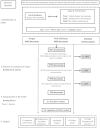The Double Burden: Climate Change Challenges for Health Systems
- PMID: 39575137
- PMCID: PMC11580064
- DOI: 10.1177/11786302241298789
The Double Burden: Climate Change Challenges for Health Systems
Abstract
Climate change presents significant challenges to human health and health systems, and there is a critical need for health systems to adapt and become more resilient in order to effectively mediate the impacts of climate change on population health. This paper analyzes existing academic literature to identify key themes, trends, and research gaps at the intersection of climate change and health systems. Utilizing a scoping review of 179 studies, we explore how health systems can enhance their resilience through effective governance, sustainable financing, resource generation, and adaptive service delivery. Our findings emphasize the importance of integrating climate considerations into health system governance, mobilizing innovative financial resources, and adapting infrastructure and workforce capacities to address climate-related health challenges. The study highlights the need for continued interdisciplinary research and targeted interventions to ensure health systems are equipped to promote equity and protect vulnerable populations in the face of climate change. These insights contribute to the development of climate-resilient health systems and identify crucial areas for future research.
Keywords: Climate Health; Climate change; Collaboration; Health systems; Public health infrastructure.
© The Author(s) 2024.
Conflict of interest statement
The author(s) declared no potential conflicts of interest with respect to the research, authorship, and/or publication of this article.
Figures
Similar articles
-
The stifling burden of climate change on African public healthcare systems.Front Public Health. 2025 May 30;13:1559737. doi: 10.3389/fpubh.2025.1559737. eCollection 2025. Front Public Health. 2025. PMID: 40520301 Free PMC article. Review.
-
Strategies to strengthen a climate-resilient health system: a scoping review.Global Health. 2023 Aug 28;19(1):62. doi: 10.1186/s12992-023-00965-2. Global Health. 2023. PMID: 37641052 Free PMC article.
-
Strategic analysis of Iran's climate resilient health system.BMC Health Serv Res. 2024 Sep 30;24(1):1149. doi: 10.1186/s12913-024-11621-9. BMC Health Serv Res. 2024. PMID: 39350069 Free PMC article.
-
Climate finance opportunities for health and health systems.Bull World Health Organ. 2024 May 1;102(5):330-335. doi: 10.2471/BLT.23.290785. Epub 2024 Feb 29. Bull World Health Organ. 2024. PMID: 38680468 Free PMC article.
-
Building Climate-Resilient Health Systems in India: A Comprehensive Health Systems Approach.Cureus. 2024 Sep 8;16(9):e68951. doi: 10.7759/cureus.68951. eCollection 2024 Sep. Cureus. 2024. PMID: 39385862 Free PMC article.
Cited by
-
Influence of Mediterranean Diet and Incidence of Global Warming on Food Habits and Plant Growth in Northern Mediterranean Latitudes: Narrative Review.Nutrients. 2025 Feb 14;17(4):677. doi: 10.3390/nu17040677. Nutrients. 2025. PMID: 40005005 Free PMC article. Review.
-
Building climate-resilient health systems in Sierra Leone: addressing the dual burden of infectious and climate-related diseases.Infect Dis Poverty. 2025 Mar 24;14(1):23. doi: 10.1186/s40249-025-01294-9. Infect Dis Poverty. 2025. PMID: 40122844 Free PMC article.
-
The stifling burden of climate change on African public healthcare systems.Front Public Health. 2025 May 30;13:1559737. doi: 10.3389/fpubh.2025.1559737. eCollection 2025. Front Public Health. 2025. PMID: 40520301 Free PMC article. Review.
References
-
- Wood R, Crucifix M, Lenton TM, et al.. A climate science toolkit for high impact-low likelihood climate risks. Earth Future. 2023;11:e2022EF003369.
-
- Chirico F, Nowrouzi-Kia B. Post-COVID-19 syndrome and new challenges posed by climate change require an interdisciplinary approach: the role of occupational health services. J Health Soc Sci. 2022;2:132-6.
-
- World Health Organization. Operational framework for building climate resilient and low carbon health systems. World Health Organization. 2023. Accessed on February 24, 2024. https://www.who.int/publications/i/item/9789240081888
Publication types
LinkOut - more resources
Full Text Sources







